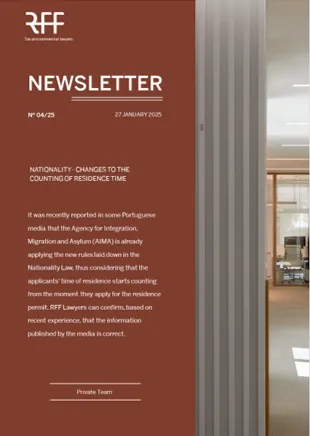Portuguese nationality - Changes to the counting of residence time

Portuguese nationality - Changes to the counting of residence time
It was recently reported in some Portuguese media that the Agency for Integration, Migration and Asylum (AIMA) is already applying the new rules laid down in the Nationality Law, thus considering that the applicants' time of residence starts counting from the moment they apply for the residence permit.
RFF Lawyers can confirm, based on recent experience, that the information published by the media is correct.
FRAMEWORK
On 5 March 2024, it was published the tenth amendment to the Portuguese Nationality Law, which regulates the attribution and acquisition of Portuguese nationality
Among the various changes approved, the length of residence for the purposes of applying to acquire nationality by naturalization will now be counted from the moment the first application for a residence permit is submitted. Previously, residence time was only counted from the moment the residence permit was granted.
This change is intended to compensate the long waiting periods between the submission of the application and the actual granting of the residence permit, as, during this period, many applicants already reside in Portugal
IMPLEMENTATION OF LEGISLATIVE CHANGES
When the legislation was passed, it was established in the amendment diploma that the Portuguese Government would duly revise the Nationality Law Regulation. This Regulation provides the comprehensive framework for the acquisition and conferral of citizenship, while also presiding over the practical aspects of the associated bureaucratic procedure. The fact is that the amendments to the Nationality Law were not dependent or conditional on the amendment of the Regulation.
The amendment to the Regulation would indeed be useful in clearing up some of the doubts that have arisen since the approval of the changes to the Nationality Law, but it does not prove to be, either in practical terms or by analysing the letter of the law, a condition for the applicability of the new rules.
Even so, there were still those who argued that the new provisions of the Nationality Law would only come into force once the Regulation had been amended. However, since the 90-day deadline for amending the Regulation has already passed, without the Portuguese Government having approved any legislation to that effect, doubts have been dispelled.
In the same vein, some Portuguese media recently reported that the Portuguese Agency for Integration, Migration and Asylum (AIMA) is already applying the new rules laid down in the Nationality Law, thus considering that the applicants' time of residence begins to be counted from the moment they apply.
RFF Lawyers can confirm, according to recent experience, that the information released by the media is correct.
Thus, the Applicants no longer have to wait for the procedure for granting a residence permit to be completed in order to start counting the five years of residence required for the citizenship application.
THE MOMENT RESIDENCE TIME STARTS COUNTING
In relation to the enactment of the Nationality Law, a point of contention arose pertaining to the determination of the submission date of the application. This issue becomes particularly ambiguous given the intricate administrative processes involved in various residency permits, which often consist of multiple phases. This is particularly relevant to Investment Residence Permits, colloquially referred to as "Golden Visas", and Expressions of Interest.
What is certain is that AIMA understands - in our view correctly - that, under the new legal provisions, the counting of residence time begins with the submission of the application through the electronic platform, i.e., in the case of Golden Visas, from the date of payment of the analysis fee.
As a result, after experiencing unexpected delays - sometimes lasting years - in the residency permit process, many applicants have now had their initial plans revived and are now able to move forward or are closer to moving forward with their applications for Portuguese nationality.
This is a measure that restores citizens' confidence in the Portuguese legal and administrative systems.
***
Rogério Fernandes Ferreira
Duarte Ornelas Monteiro
Joana Marques Alves
Ana Sofia Gariso
Amélia Carvela
Carlos Alcântara Neves
João Aguiar Câmara
Inês Marques Dias
João Rebelo Maltez
Nicolas Corrêa Simonini
